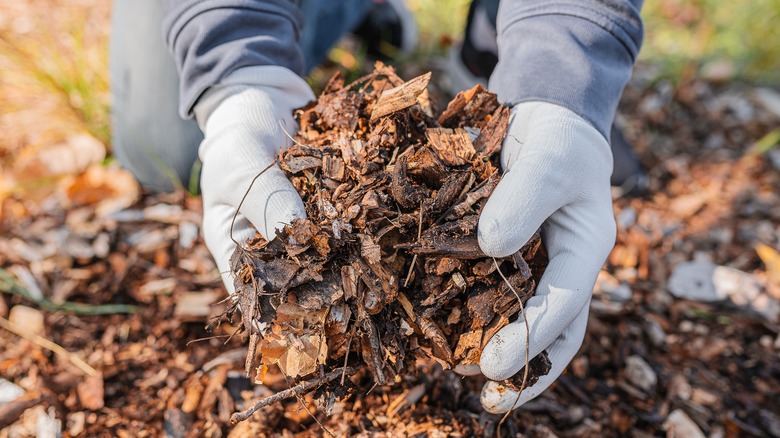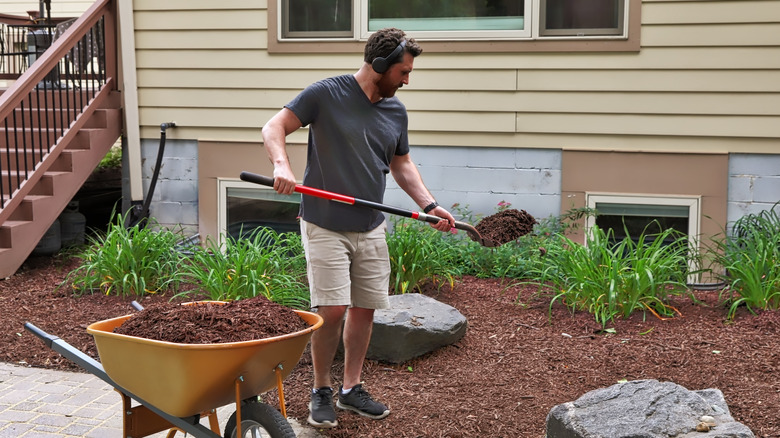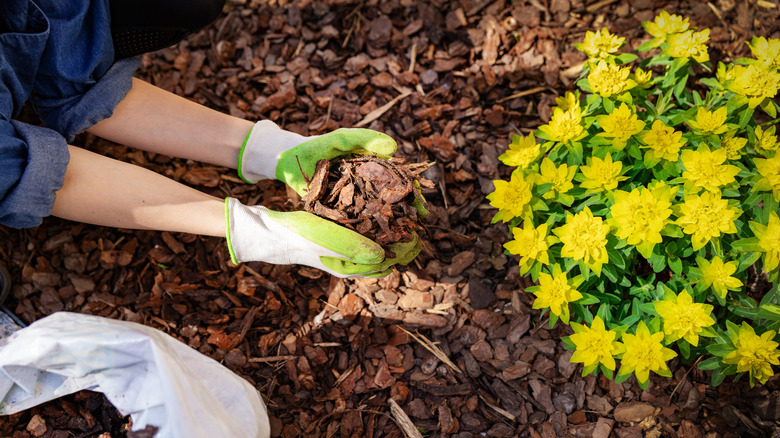The Type Of Mixed Mulch That Can Actually Do Damage To Your Garden
In order to achieve a successful home garden, you have to incorporate several farming practices into your routine. A lot of people assume that all you need are seeds, soil, and water, but the way you care for your yard matters as well. One important agricultural practice that you should incorporate straight away is mulching.
Mulching involves covering the soil with a layer of organic material such as twigs, leaves, and decaying material such as compost. While mulching is beneficial for a number of reasons, people still make common mulching mistakes in the garden. One such widespread error is using mixed mulch.
While plants undergo photosynthesis through their leaves, they also absorb a lot of nutrients from the ground. You have to pay heed to the health of your yard soil, which is why mulching is so important. When properly carried out, it helps prevent weed growth, retain soil moisture, and add organic material back into the soil, enhancing microbial activity.
Mixed mulching entails adding the mulch to the topsoil and then mixing it with the soil. While this may seem harmless at first glance, it comes with a lot of long-term repercussions that can damage your garden.
Mixed mulching depletes soil nutrients and makes digging and weeding difficult
Mulching isn't just for show. With its numerous benefits, it will serve you and your garden well as long as you do it right. However, mixing your mulch with the soil will do your garden more harm than good.
Greg Baka, gardener and owner of Easy Digging yard improvement tools, told Better Homes and Gardens that while compost can be mixed with the soil below, the same cannot be said for bark or wood mulch. According to him, these types of mulch should only be allowed to sit on top of the soil because they can negatively alter the structure of the soil when mixed. "Mulch mixed with soil causes difficulties in digging and weeding," he said. Mixed mulching also deprives the garden of vital nutrients from the soil that would otherwise be beneficial to the roots. "In the process of decaying," Baja explained, "it binds up the available nitrogen that could be going to the plants you want to grow." Plants use nitrogen to create chlorophyll, an essential phytonutrient that is used in photosynthesis to harness solar energy.
Find the right mulch for you
When choosing the best type of mulch for your garden, you need to consider what you want the mulch to ultimately achieve and also determine the amount of soil moisture required by your plants. You can either use organic or inorganic mulch depending on your needs. Organic mulch is made up of biological material such as leaves, twigs, wood, and bark. Because these objects are organic, they will decompose, providing the soil with nutrients and encouraging bioactivity. They also serve to cool down the soil temperature. Organic mulch is great if you have a garden with crops that require a lot of moisture and relatively lower temperatures. However, there is an added risk of weed seeds being embedded in the mulch.
Inorganic mulch can consist of plastic material, rubber pellets, or even gravel. They don't decompose and they mostly serve as weed and pest repellants. Inorganic mulch is perfect for people who don't have the time to constantly reapply mulch in the yard since it doesn't break down. However, it can result in an increase in soil temperature, so if your crops or plants need warm temperatures, this is your best bet.


